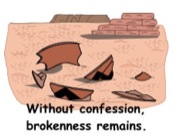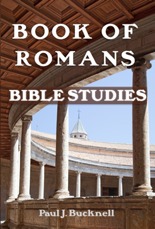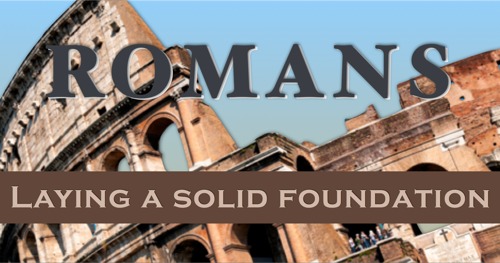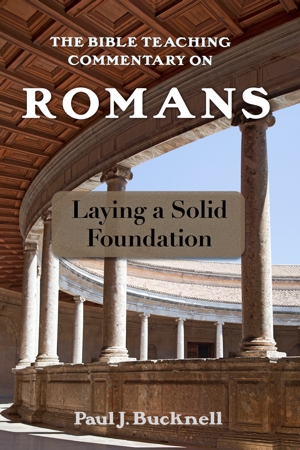
Romans: Laying a Solid Foundation
The Bible Teacher's Commentary
Paul J. Bucknell
The Bible Teacher's Commentary
Paul J. Bucknell
Outlines | Purpose | Author | Church | Time | Rome | Jews | Jews & Church | Outlines
Purpose of Romans
God's great plan to establish His righteousness throughout the earth is accomplished through the Gospel of Christ.


Simple Outline of the Book of Romans
R |
A. Righteousness Revealed |
Gospel |
Romans 1:1-17 |
O |
B. Righteousness Obsolete |
Sin |
Romans 1:18-3:20 |
M |
C. Righteousness Made |
Justification |
Romans 3:21-5:21 |
A |
D. Righteousness Attained |
Sanctification |
Romans 6-8 |
N |
E. Righteousness eNlarged |
Worldwide |
Romans 9-11 |
S |
F. Righteousness Spread |
Service |
Romans 15-16 |
The Message of Romans by Paul Bucknell
R |
O |
M |
A |
N |
S |
The CrossGod's righteousness is shown through the glorious Gospel of Jesus Christ. |
The DitchMan's sin and guilt is clearly evident through its presence and judgment. |
The RoadGod reconciles man through faith in Christ's work on the cross. |
The PlanThe Lord does not only call us righteous but enables us to live godly lives. |
The WorldGod makes His Name great by spreading His grace to the whole world. |
The KingdomGod's plan is fulfilled by His people living out righteousness lives. |
Truths from Romans Help Us Discern Error
Many people are happy to avoid the sin section (Romans 1:18-3:20). Without the message of sin, however, there is no grace. No grace, no Gospel. Jesus leads us into the faith through a thorough acknowledging of the bankruptcy of our spiritual lives (Matthew 5:3-4) which is totally consistent with Paul's outline of the Gospel of Jesus Christ.
Many religious people avoid the section on justification by faith in Christ (Romans 3:21-5:21). They are thoroughly religious and sufficiently confident of their good deeds. When man looks at himself, he will die. But only if he looks to Christ, will he live. Justification by faith in Christ is the antidote for the poison of sin. (John 3:14-16)
Others want to stop with justification by faith and despose of the section on sanctification (Romans 6-8). They like to think that they are going to heaven. In many cases, however, they wrongly conclude that they can get with living their lives as before. But God has not only delivered us from the curse of sin (justification) but also from the power of sin (sanctification). Christians were given a new life to live it out in holy dedication to God.
Still others will stop with sanctification and dismiss service (Romans 9-16) as having any importance whether it be in worldwide missions or local service in the assembly of God's people. These people have turned inward and think that spirituality is best expressed privately and quietly. Jesus has clearly showed us how this perspective is faulty to its core. Without service, there is no worship. With no spiritual service, there is no spirituality.
The Occasion and Purpose of Writing Romans
• Enable believers to be confident of and clearly communicate the Gospel.
Paul had not established the church at Rome and had no apostles there. Therefore he wanted to make sure they were on the right theological track. He gave them systematic teaching of the Christian faith.
• Help Christians to clearly communicate the Gospel with others.
They lived under Caesar in the powerful Roman empire sometimes with persecution. He encouraged them to keep steadfast under pressures and showed them the relationship they have with the empire and Roman culture.
• Share with the Roman church that his visit will be delayed and short.
He was returning from his 3rd missionary journey to deliver an offering from the Gentiles to the poverty-stricken Jews at Jerusalem (15:25-28). Romans was a letter in which he made preparation with the Romans for his 4th missionary journey to Rome and the West.
•Excite them with the great worldwide plans of God.
The Jews were regularly interfering with the expansion of the gospel to the Gentiles. Paul gave them a proper theological perspective on the relationship between the Jews and the Gentiles so they could vigorously spread God's kingdom.
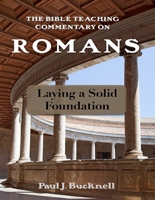 Paul, the Author of Romans
Paul, the Author of Romans
•Steeped in Old Testament teachings; Pharisee of Pharisees (Phil 3:5).
• Logical thought; from age 13 trained by Gamaliel according to law (Ac 22:3).
• Both parents were Jews and yet were Roman citizens (Acts 22:25-29).
• Born in Tarsus of Cilicia but brought up in Jerusalem (Ac 22:3).
• Highly committed and motivated: Dramatic conversion (Ac 22:5-10).
• Suffered intensely (II Co 11:23-27).
The Church at Rome: the addressee
• ' Beloved of God' indicates their confession of Christ (Ro 1:7).
• They lived in Rome.
• The church was known for its strength and influence throughout the world (Ro 1:8).
• Composed of Jews (Ro 2:17, 4:12) and Gentiles (Ro 11, 15:15-16).
• Possessed characteristics of an urban setting (Gromacki, p. 179).
• They lived in a heathen, idolatrous, lust-oriented society.
The Time and Place of Writing Romans
• Paul wrote Romans after he wrote the 2 Corinthian epistles (Ro 15:26).
• Paul wrote it during his brief stay at Corinth around 55-56 AD (Gromacki, p. 180).
• Phoebe probably carried it there.
Short History of Rome
That Rome was founded in 753 BC is a fanciful legend more than objective history. Rome was located on the Tiber river 15 miles in from the sea. Over time the swamps and mounds gradually were built up and so known as 'The City of Seven Hills.' In NT times the population hovered over a million with some placing it about 4 million. There were about 420 temples to Roman gods and gods of conquered people. A good-sized colony of Jews lived there.
Relationship between Rome & the Jews
Three hostile rulings against the Jews in Paul' s life:
1) The expulsion of Jews under Tiberius in 19;
2) the withdrawal of the rights of assemble by Claudius in 41; and
3) the expulsion of Jews by Claudius in 54 AD..
Each time the rulings seem to lose effect with time. Claudius died in 54 AD. Nero followed. " ... Only in the latter years of Nero' s reign (AD 64) can we detect an awareness that Christians had become a distinct entity. In fact, in the 30' s they returned as well as after Claudius' death in 54. So the Jewish Christians, Priscila and Aquila, came back with many others. Besides direct taxes, there were many indirect taxes (Tacitus reports that the year 58 was marked by persistent public complaints regarding indirect taxes) which probably affected the Jews.
The Jews & the Church in Rome
Significantly Paul doesn't mention Rome as a church because it had not fully come out of the synagogue at that point. Christianity in Rome emerged from the Jewish community in Rome and therefore had passed on numerous teachings of the law along with the gospel. " ... The best estimate of the number of Jews in Rome in the middle of the first century AD is about 40,000-50,000, most of them slaves and freedmen."
"An increasingly popular view in the second half of the twentieth century is that Paul wrote to counter (potential) divisions within Rome among the Christian house churches, particularly the danger of gentile believers despising less liberated Jewish believers." (Rom 16:17-19)
The Christians in Rome
"The Christians must have been well established and fairly numerous by the middle of the 50s. Paul had wanted to visit them " for many years (1:10, 15:23). They had been sufficiently strong (or provocative) by AD 49 to provide the occasion for the " constant disturbances" with the Jewish community which resulted in the expulsion of (most? many of?) the Jews. And in 64 they could be described as a new " sect" with a " a great multitude" , " vast numbers" indicted by confessed Christians to provide many hours of " entertainment" by the varied deaths they suffered. The widespread use of such punishments suggests that few of the Christians had citizens' rights."
From Romans 16 it can be deduced that a large proportion of the Christians in Rome were slaves or freedmen/women (at least 14 out of 24 names were commonly used slave names). 8 out of 14 seem to be fairly well-to-do. The Christians met in house churches.
Two Outlines of Romans
Two Roman outlines are included here. Achtemeir's outline from John Knox Press is good but not included here.
OUTLINES OF ROMANSby Warren W. Wiersbe (in Be Right)Theme: The righteousness of God Introduction 1:1-17I. SIN – Righteousness Demanded 1:18-3:20 A. The Gentiles guilty – 1:18-32 II. SALVATION – Righteousness Declared 3:21-5:21 A. Justification stated – 3:21-31 III. SANCTIFICATION – Righteousness Defended 6-8 A. Victory: the flesh – 6 IV. SOVEREIGNTY – Righteousness Declined 9-11 A. Israel'
s past riches – 9 V. SERVICE– Righteousness Demonstrated 12:1-15:7 A. In the Church body – 12 Conclusion 15:8-16:27 |
OUTLINES OF ROMANSby Dr. Dunnett in New Testament SurveyI. Introduction 1:1-17A. Salutation 1:1-7 II. The Need for Redemption: Sin 1:18-3:20A. Gentile Sin 1:18-2:16 III. The Provision of Redemption: Justification 3:21-5:21A. The fact 3:21-31 IV. The Effect of Redemption: Sanctification 6:1-8:39A. The union with Christ 6:1-23 V. The Scope of Redemption: Jew and Gentile 9:1-11:36A. Israel'
s past - God'
s judgment for sin 9:1-33 VI. The Fruit of Redemption: Service 12:1-15:13A. The call to dedication 12:1-2 VII. Conclusion and greetings 15:14-16:27 |
 The BFF New Testament Bible Digital Library has all the Roman study and advanced study questions in both pdf and .doc format. The lessons are altogether in one document (272 pages long) ready to be printed or first modified to your teaching style. This is just one file on the BFF New Testament Training Library that has an incredible amount of training materials.
The BFF New Testament Bible Digital Library has all the Roman study and advanced study questions in both pdf and .doc format. The lessons are altogether in one document (272 pages long) ready to be printed or first modified to your teaching style. This is just one file on the BFF New Testament Training Library that has an incredible amount of training materials.
See BFF's Resource Center for purchasing thislow cost digital library.
Free Romans Bible Studies!Romans Background, Outline and Overview |
Romans 4:01-12 Bible Studies |
Romans 11:11-24 Bible Studies |
BFF -> Moving our generation's heart and mind closer to the Lord through the powerful truth of God!

